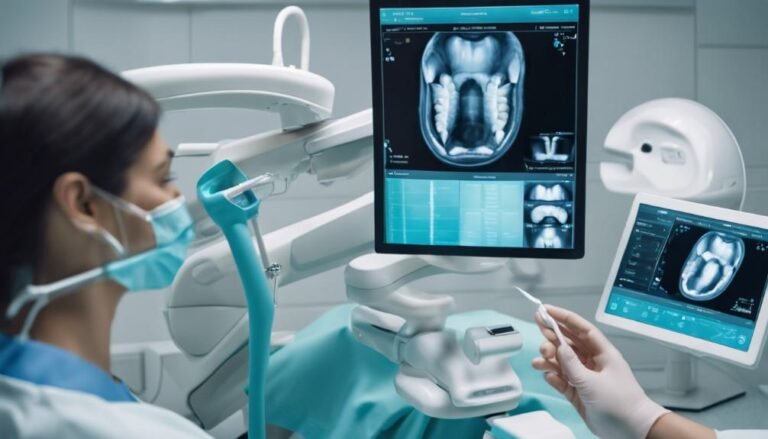AI for Post-Surgical Care
Did you know that post-surgical complications are reported in about 15% to 20% of patients undergoing procedures? Imagine a scenario where AI could potentially decrease these numbers substantially. The integration of artificial intelligence in post-surgical care holds the promise of transforming traditional healthcare practices, offering a glimpse into a future where patient outcomes are optimized through innovative technologies. By harnessing the power of AI for personalized monitoring and predictive analytics, the landscape of post-surgical care is evolving rapidly to enhance recovery processes and improve patient well-being.
Key Takeaways
- AI enhances patient recovery post-surgery with personalized care and continuous vital sign monitoring.
- Predicts post-surgical complications using patient data analysis for early intervention strategies.
- Remote monitoring and telemedicine enable proactive surveillance and early detection of warning signs.
- Collaborative efforts integrate AI technology for seamless post-surgical care delivery.
- Future of AI in healthcare includes personalized rehabilitation plans and remote patient monitoring for optimized care.
Enhancing Patient Recovery With AI
AI technology plays an essential role in enhancing patient recovery following surgical procedures by providing personalized care and monitoring crucial signs continuously.
Through remote monitoring, AI systems can track a patient's progress post-surgery without the need for constant in-person visits. This not only reduces the burden on healthcare providers but also allows for earlier detection of any potential complications.
Telehealth integration further enhances this process by enabling real-time communication between patients and healthcare professionals, ensuring immediate intervention if issues arise.
Monitoring Vital Signs Effectively
To monitor essential signs effectively post-surgery, healthcare providers utilize advanced wearable devices that continuously track key physiological parameters. Remote monitoring plays an important role in ensuring timely detection of any deviations from normal vital signs.
These wearable devices are equipped with sensors for monitoring metrics like heart rate, blood pressure, oxygen saturation, and temperature, providing real-time data to healthcare teams. Through remote monitoring systems, healthcare providers can access this data from a centralized location, enabling them to keep a constant check on the patient's vital signs without the need for continuous bedside presence.
Moreover, these advanced systems are designed to generate real-time alerts in case of any abnormalities in the monitored vital signs. This immediate notification mechanism allows healthcare professionals to intervene promptly, potentially preventing complications or adverse events.
Predicting Post-Surgical Complications
To effectively predict post-surgical complications, you can utilize AI algorithms that analyze patient data to assess complication risks.
By implementing these predictive models, healthcare providers can intervene early, potentially preventing severe complications and improving patient outcomes.
Early intervention strategies based on AI predictions can aid in personalized patient care and reduce the burden on healthcare resources.
Complication Risk Assessment
How can advanced algorithms accurately assess the risk of potential post-surgical complications?
In the field of complication prevention and personalized care, risk assessment plays an essential role in developing effective intervention strategies. By leveraging artificial intelligence (AI) algorithms, healthcare providers can analyze vast amounts of patient data to predict the likelihood of complications following surgery.
These algorithms take into account various factors such as the patient's medical history, current health status, type of surgery, and potential risk factors.
Through sophisticated data analysis, AI can identify patterns and trends that may indicate a higher risk of post-surgical complications. This personalized approach allows healthcare teams to tailor their intervention strategies to mitigate these risks effectively.
Early Intervention Strategies
Utilizing advanced AI algorithms enables healthcare providers to predict post-surgical complications early by analyzing an extensive range of patient data. Essential intervention strategies play a significant role in improving patient outcomes and reducing healthcare costs.
Remote monitoring and telemedicine solutions are instrumental in this process, allowing for continuous patient surveillance and timely intervention.
Remote monitoring technologies enable healthcare teams to track vital signs, symptoms, and recovery progress in real-time from a distance. By collecting and analyzing this data, AI systems can detect subtle changes or warning signs that may indicate potential post-surgical complications. This proactive approach allows healthcare providers to intervene promptly, providing necessary treatments or adjustments before complications escalate.
Telemedicine solutions further enhance early intervention strategies by facilitating virtual consultations and follow-ups. Patients can communicate with healthcare professionals conveniently, enabling quick assessments and guidance without the need for in-person visits. This streamlined communication promotes early detection of complications, prompt intervention, and improved post-surgical care outcomes.
Personalized Care Plans Using AI
You can benefit from personalized care plans that leverage AI to tailor recovery recommendations to your specific needs.
These plans are designed to optimize your post-surgical care by utilizing automated monitoring systems to track your progress and adjust the care plan accordingly.
With AI-driven personalized care plans, you can experience more effective and efficient recovery processes that are tailored to your unique recovery journey.
Tailored Recovery Recommendations
Creating personalized care plans using AI algorithms allows for tailored recovery recommendations based on individual patient data, enhancing post-surgical outcomes. By utilizing AI for recovery optimization, healthcare providers can offer customized guidance to patients, ensuring a more effective and efficient healing process. These tailored recommendations take into account a multitude of factors such as the patient's medical history, surgical procedure specifics, recovery progress, and potential risk factors.
AI algorithms analyze vast amounts of patient data to generate personalized care plans that adapt to the patient's evolving needs during the recovery period.
Through the integration of AI technologies, healthcare professionals can provide patients with precise instructions on post-surgical care, including medication schedules, physical therapy routines, dietary recommendations, and warning signs to watch for. This level of personalized guidance not only improves patient compliance but also minimizes the risk of complications and enhances overall recovery outcomes.
Ultimately, AI-driven tailored recovery recommendations play an essential role in optimizing post-surgical care and promoting better patient well-being.
Automated Monitoring Systems
Personalized care plans utilizing AI algorithms can be further enhanced through the implementation of automated monitoring systems, ensuring continuous tracking and adjustment of recovery progress based on real-time data analysis.
Remote monitoring plays an important role in post-surgical care by enabling healthcare providers to remotely observe a patient's vital signs, activity levels, and overall recovery progress.
These monitoring systems, integrated with machine learning algorithms, can analyze vast amounts of data to detect subtle changes that may indicate potential complications or deviations from the expected recovery trajectory.
Overcoming Challenges in Implementation
Addressing the intricacies of integrating AI technology into post-surgical care requires a thorough understanding of the challenges that healthcare providers may encounter. Technology integration poses a significant challenge as AI systems need to seamlessly integrate with existing healthcare infrastructure to guarantee smooth operation.
Ensuring data security is essential to protect patient information from breaches or unauthorized access, requiring robust encryption protocols and secure data storage measures.
Moreover, staff training is pivotal to effectively utilize AI tools in post-surgical care. Healthcare professionals must be trained to interpret AI-generated insights accurately and make informed decisions based on the data provided.
Patient engagement also plays a critical role in the successful implementation of AI in post-surgical care. Educating patients about the benefits of AI technology, addressing concerns about data privacy, and involving them in the decision-making process can enhance patient satisfaction and outcomes.
Overcoming these challenges demands a collaborative effort between healthcare providers, IT specialists, and patients to ensure the seamless integration and effective utilization of AI technology in post-surgical care.
Future of AI in Healthcare Practices
To envision the future of AI in healthcare practices, it's imperative to contemplate the evolving landscape of technological advancements and their potential impact on post-surgical care. AI-powered rehabilitation technologies are poised to revolutionize post-surgical recovery by providing personalized, adaptive rehabilitation plans tailored to individual patient needs. These AI systems can analyze vast amounts of data to optimize rehabilitation exercises, track progress, and adjust treatment plans in real-time, leading to more efficient and effective recovery outcomes.
Furthermore, remote patient monitoring capabilities enabled by AI offer the potential to enhance post-surgical care by allowing healthcare providers to remotely track crucial signs, medication adherence, and overall recovery progress. This continuous monitoring can enable early detection of complications, prompt interventions, and personalized care adjustments without the need for frequent in-person visits, thereby improving patient outcomes and reducing healthcare costs.
As AI continues to advance, its integration into healthcare practices is expected to drive significant improvements in post-surgical care delivery and patient outcomes.
Conclusion
As you navigate the intricate web of post-surgical care, think of AI as your guiding compass, leading you through uncharted territories with precision and insight.
Just as a skilled navigator uses stars to chart a course, AI utilizes data to plot a personalized recovery journey for each patient.
Embrace the power of AI in healthcare practices, and watch as it transforms the landscape of patient care with its innovative and predictive capabilities.







